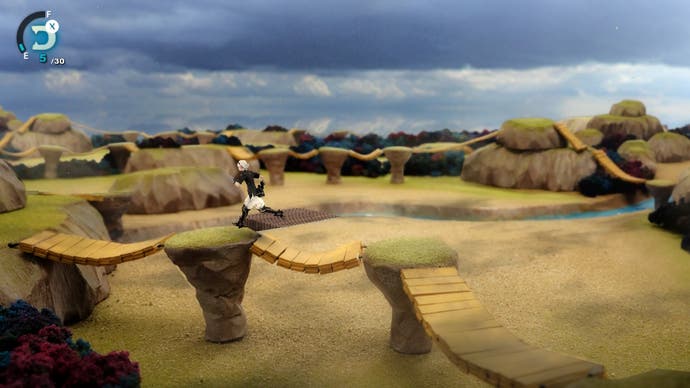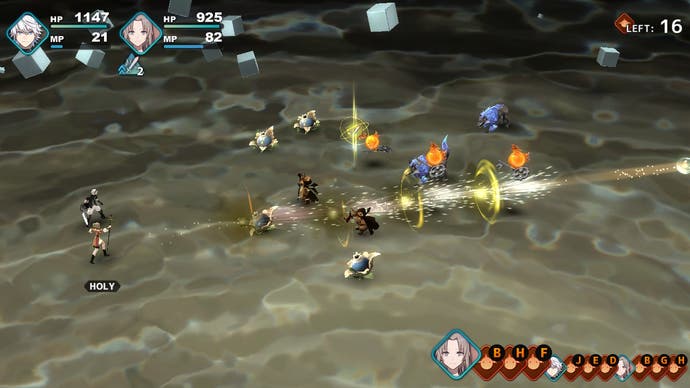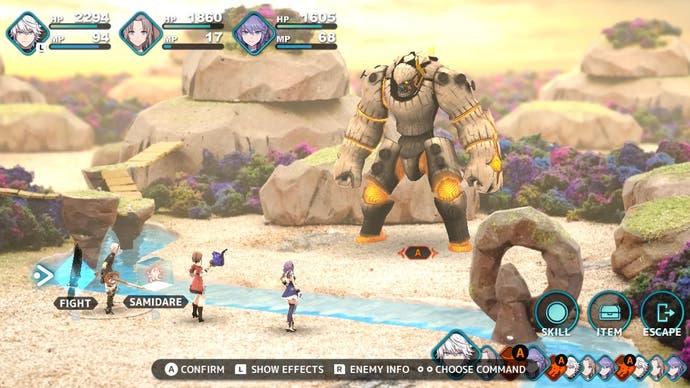Final Fantasy creator Hironobu Sakaguchi is once again back with Square Enix, over 20 years since leaving the company in 2003 shortly after the release of Final Fantasy X-2. Since then, when he’s not busy playing Final Fantasy 14, Sakaguchi has been making games with his studio Mistwalker: that includes the likes of Blue Dragon, Lost Odyssey, and an impressive Apple Arcade exclusive called Fantasian.
But it’s exclusive no more, with Square Enix stepping in to publish Fantasian Neo Dimension, a new port of the game for PC and consoles. It’s a game that’s already steeped in Final Fantasy history: designed by Sakaguchi as a natural extension of his work on the series, with music from Final Fantasy composer Nobuo Uematsu. This new version of the game bolsters that further with its battle music selector featuring pieces from throughout series history.
Now, Fantasian’s heroes can battle enemies to the classic theme of the pixel remasters, or something more modern: Final Fantasy 14, Final Fantasy 7 Rebirth, or Final Fantasy 16, for instance. It’s a cute addition that brings Fantasian and Final Fantasy full circle.
However, despite its callbacks to RPG traditions, I’m not convinced this port is the best way to play Fantasian. At Gamescom, I went hands-on with the Switch version in handheld mode, probably the closest console equivalent to the original mobile experience. But this is a game made for Apple Arcade, for touch screens, and I can’t help but feel something is lost in the transition.
Before that, though, the basics for anyone unfamiliar with Fantasian – understandable, considering its Apple Arcade exclusivity. Fantasian is a very traditional Japanese RPG, with turn-based combat, randomized battles, and anime-styled characters in a plot exploring the dichotomy of magic and technology. That alone immediately screams Final Fantasy, not to mention Uematsu’s nostalgic score, but Sakaguchi has included some clever ideas to modernize the retro form.
One of those is the Dimengeon system, where random battles are collected and bottled up to be fought all together when players choose – a smart way of streamlining grinding and the sometimes stuttering rhythm of traditional gameplay. It also allows players to dictate their own difficulty, either by frequently fighting small groups of enemies or collecting more for a lengthy battle. It should be noted, too, that Fantasian is a tricky game, with bosses especially acting as miniature puzzles for character abilities and elemental weaknesses.
And then there are the visuals. Many Final Fantasy fans remember fondly the golden age of PS1 classics, where these grand, imaginative worlds were depicted in 2D backdrops to allow the characterful polygonal figures to stand out. Sakaguchi employs a similar effect with Fantasian, this time with actual dioramas.

It’s these that lend Fantasian its unique aesthetic: the development team built hand-crafted models of the world, which were then scanned and recreated in the game. The fluffiness of trees and bushes contrasts with gravel paths and minutely detailed stone buildings, each area then populated with digital figures. The effect is as if playing on a tabletop world, except it’s in the palm of your hand, and it feels real and alive in a way even the most photorealistic graphics struggle to achieve.
It’s also a world begging to be touched. It’s full of texture and, on mobile, characters are controlled by tapping the screen to direct movement, while menus are easily swiped between, and in battle the careful curvature of aiming and bending spells is controlled with your finger. All of this makes the game interactive in a way only mobile games can achieve.
Unfortunately, this is lost in the transition to console. Even on Switch, there are no touchscreen controls. Instead, the game’s character movement and spell aiming are controlled with the stick, while menus work as with any other game. It lacks the tactile nature of the original release, but more so it makes exploring the world awkward. There’s a reason, for instance, the Resident Evil games – with their similarly static backgrounds – employed tank controls, where forwards mean forwards no matter what angle the view. In Fantasian, to really show off those dioramas, Sakaguchi loves to spin the camera around for an opposing view; but where originally a quick tap of the screen was enough for characters to head to their destination, now the direct control leads to all sorts of confusion with each camera transition. It’s nowhere near as smooth or intuitive.


Still, the move to a bigger screen brings fresh clarity to the craftsmanship of those dioramas. Stretched even to the Switch’s screen, the world feels a little empty when compared to its seeming bustling nature on a phone. But the hundreds of hours of work that went into creating those models certainly deserves to be admired.
A major bonus to this new port is, of course, that it will expand the game’s audience, and I sincerely hope more players are introduced to this excellent game. Fantasian is a cult classic left isolated on a mobile subscription and deserves to be played by many more. For RPG fans, it’s a modern example of the genre from a mastermind and if this port is your only way to play, I’d thoroughly recommend checking it out once released. For me, though, I’m happy to stick to my existing mobile playthrough for the original experience.
#Final #Fantasy #creators #Fantasian #cult #classic #RPG #freed #Apple #Arcade #tactility #lost #transition
